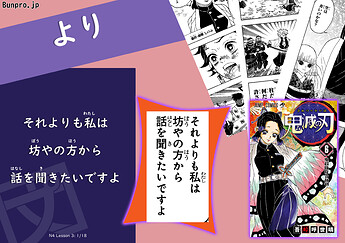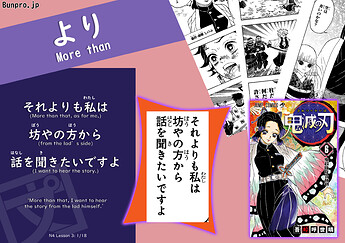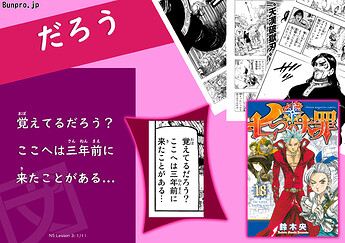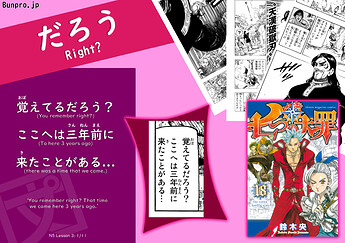July 6th: より
Looks like we were all on the same path yesterday!
Translation
Since that is more of a boy than me, I want to listen to their conversation. I had to look up 坊や since while I knew the kanji itself, the word is still new to me and clearly my sentence still makes no sense. Still figuring out if のほう・から is used like のほうが or if it’s something completely different, tough!!
Sentence
この問題より昨日の問題の方が難しいです Still sometimes confused about the difference between using just より vs using より・の方が, but perhaps I’m overthinking it!
Summary
I’d rather hear from the boy (on what he has to say).
文化だから翻訳では、より同じ気分を伝えるのは難しいです。
I’ll try my hand at this…
Translation
Even more than that [your story], I want to hear the story from the boy’s point of view. よ!
Translation
I’m nothing but a greenhorn, so I want to hear your story.
Compared to the responses above, it looks like I totally misunderstood this sentence 
Translation
I’d rather hear the story from the boy (than from your point of view).
Very confusing sentence. I am not sure at all about the 坊やの方から part : 
Translation
Even more than that I really want to hear the story from you, boy.
Use case
前の文より今日の文の方が翻訳しにくいと思います。
Our translation:
より
Note: Be careful of the より~の方 with this one. Although it still functions as a comparison, it only really serves to strengthen から. So ‘comparatively, from the side of the boy, is where she wants to hear the story’.
Thanks for the explanation! I thought that の方 had to be followed by が, always…
I have a few questions:
- does も after より add a nuance of strength in the comparison? (hence my translation by “even more”)
- I translated 坊や by supposing it was a way to talk to someone by using his “title” (like one can say 先生 instead of “you”). Is it a possible translation, depending on the context?
- how do we have to understand よ at the end? (with the nuance “really want” as I translated?)
Damn, yesterday’s was pretty tough! Maybe if I looked up the words it would have helped but still would have left me with the same questions @MZa asked.
Translation
You remember this yeah? We came here 3 years ago. 
Sentence
これが茶だろう。彼は茶を注文した。 My writing skills are clearly lacking behind my reading skills hah.
Translation
You remember me, right? I came here once before, three year prior…
Compound particle is throwing me a little off again. I don’t think I’ve seen へ use with ここ yet, let alone へは as a grammar point for that matter. The は here looks to be acting as a contrast marker rather than a topic marker, but I don’t quite know why へ was chosen over other potential particles.
I don’t feel very confident about this one but I’ll give it a try nonetheless.
Translation
You remember, don’t you? You came here 3 years ago.
Translation
You do remember that, don’t you? You have been here three years ago…
Summary
You (s.o.) remember, right? You (s.o.) came here 3 years ago…
ちゃんと文法を分かるために、誰か言った人を分かるが必要だろう?
1- In this sentence, より would sound like ‘rather than that’, where as よりも sounds like ‘what’s more than that’. The の方 target will always be ‘more’ of something, but you are correct, it just strengthens it.
2- 坊や is actually a bit of a tricky word, used to confuse me too. It usually translates to ‘boy’, but it has a specific nuance of someone that is still under the tutelage of someone else. In some aspect of their life, they have a 先生 or 師匠 so to speak. Even if they are a boy, but are already an expert, 坊や would not be used. The proper translation is ‘lesser’ (referring to the fact that the ‘greater’ master exists).
(Specifically to answer your question, I’d say yes, it is like a title.)
3- This よis used a lot in an elongated tone simply to make it clear that you’re directing the statement at someone. Weird example, but If I said -
“I wanna get food”
Vs
“I wanna get food mannnnn”
You would feel like the second one is directed at you, but you don’t really need to do anything about my need for food hahah.
This よ is similar to ‘man’ or however any other country uses similar words to just ‘involve’ someone in a statement with no super strong purpose.
Thanks @Asher for your answers.
Translation
You remember don’t you?
You (or I?) came HERE three years ago…
‘Here’ is in upper case to try and express the contrastive nuance of は.
Use case
その毎日の翻訳の問題は難しいけど面白いだろうね。
Looking at everyone’s answers so far it makes me have a question
q
In the first sentence someone is asked if they remember something, so that sets up the subject. I assume since the following sentence omits the subject marker that it’s still talking about only the one person’s experience. My question would be is there any way to change the meaning of the second sentence to “we came here” via other grammar points or implications rather than just explicitly saying ‘we’? Question probably makes no sense but for some reason I thought the implication for the second sentence was we so I might as well ask!
I went with “we” as well under the assumption
thought
if the speaker suggested the listener should know something, then both were probably involved in the situation. There are situations where that wouldn’t be true, I just felt this was more likely.
Our translation:
Notes: Who is this about? Is it ‘we’, ‘I’, ‘they’, ‘you’?.. Actually, it is almost certainly ‘we’! For a sentence like this, there are a few giveaway grammar points. 'だろう’, the speaker is looking for agreement about (remembering). If it were ‘me’, then instead of だろう, よ, would probably be used. If it were ‘you’, then ’へは’ would not have been used, as ’へは’ really solidifies the experience of ‘coming’ as the important memory. If only the ‘destination’ was important (implying that they didn’t travel together), then ‘に’ would have been used. What about ‘they’? The は eliminates ‘they’ here, as は refers to something that has a feeling of being complete, or finished/unchanged. We never usually use は apart from the things that we have very intimate knowledge of, so using は here would imply that the speaker knew about all of the actions of the person they were speaking about (very unlikely unless it was themselves).




